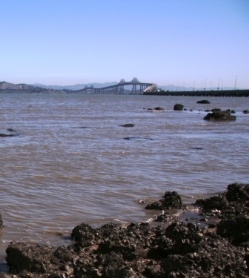Bodega Marine Lab keeps watch on ocean temperatures
Ocean waters are warming, sea level is rising, seawater is becoming more acidic, and shoreline erosion is intensifying. The world’s oceans are reacting to increased carbon dioxide and other greenhouse gases in the earth’s atmosphere.
“The physical and chemical environment of the ocean is changing with the climate,” said John Largier of the UC Davis Bodega Marine Laboratory. “This affects ecosystems — like tidal marshes and coral reefs that protect us from storms and flooding.”
The ocean brings stability to the earth’s climate. It heats up and cools down more slowly than the land and the air. With climate change, the ocean absorbs excess heat trapped in the earth’s system by the increased concentration of gases in the atmosphere.
As seawater warms, it expands. The increase in the ocean’s heat content has contributed to one of the most visible effects of global warming — rising sea level. Thermal expansion, along with melting polar ice caps and glaciers, has led to global sea level rise of more than seven inches over the last century.
“When the ocean begins to warm up, then you know that the earth’s climate is changing,” said Largier, a professor in the Department of Environmental Science and Policy. “Even if we stop putting greenhouse gases into the atmosphere right now, the ocean has warmed up, and it will take centuries for it to cool down. People don’t realize that we’ve already made a long-term commitment to climate change.”
At the Bodega Marine Lab, Largier and other scientists are studying the regional impacts of climate change on the waters off California, which include an increase in coastal upwelling. Driven by winds, upwelling pulls cold water and nutrients from the ocean depths to the surface along the shore and contributes to the “marine layer,” the blanket of cool moist air that moderates California temperatures. Largier’s research shows a trend toward stronger winds and an increase in upwelling since 1982, leading to cooler waters off central and northern California.
“Worldwide, the ocean’s surface water is getting warmer, but in California, the ocean is getting colder near shore,” said Largier. “This is intriguing because it shows that climate change is not going to have the same effect everywhere. There will be regional differences.”
This article was condensed slightly from UC Davis “CA&ES Outlook” magazine. Read the full article on page 7.
Read John Largier's scientific advisory group report on how changes in the ocean might affect two valuable marine sanctuaries off the northern California coast: "Climate Change Impacts: Gulf of the Farallones and Cordell Bank National Marine Sanctuaries"

John Largier along the northern California coast. (Photo: Jennifer Sauter/UC Davis)


